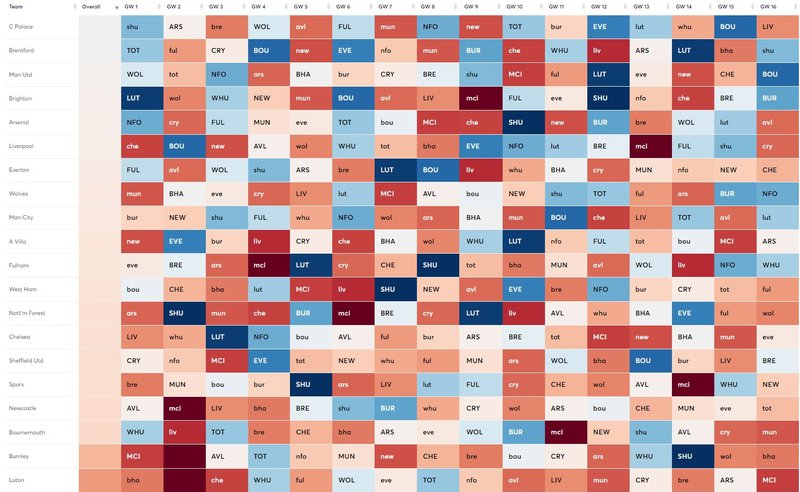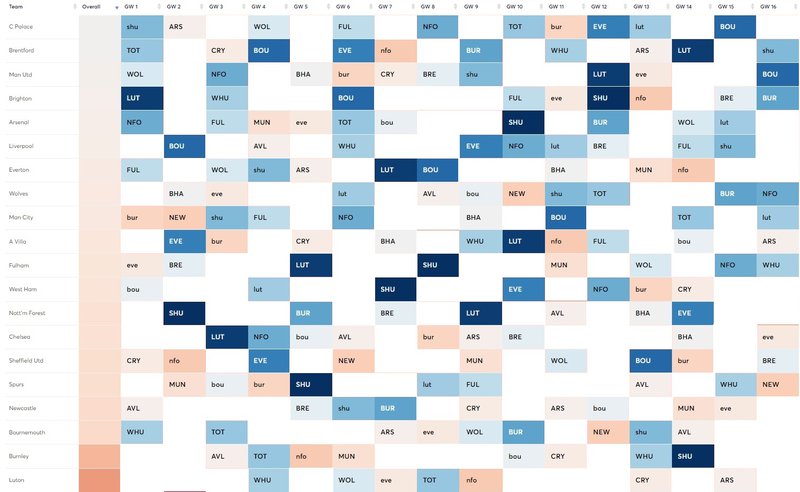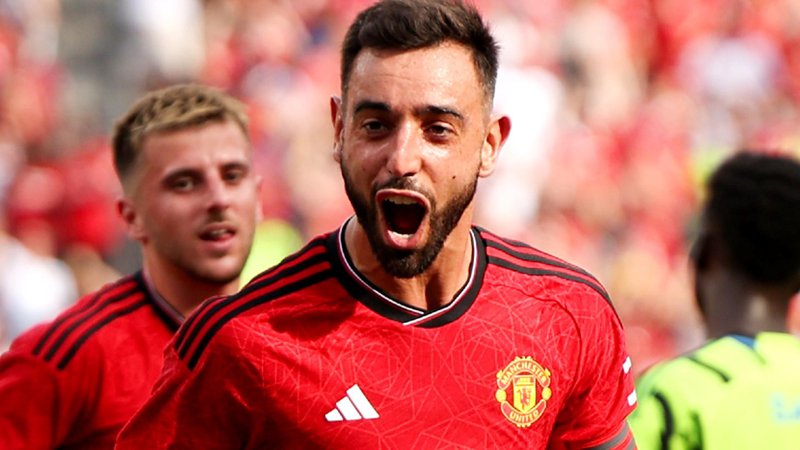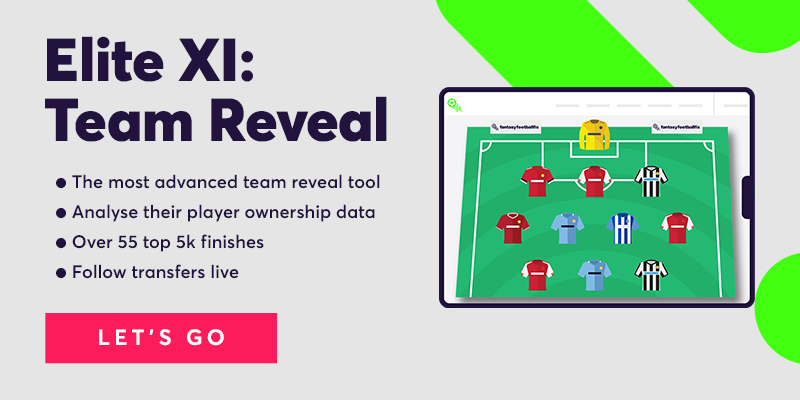With the season still to kick off, it is way too early to be doing any sort of serious planning as regard our chips. That being said, keeping an eye on the schedule can give us early indications as to when we should phase certain players in or out, or even the optimal time to play our first Wildcard.
Premium Plus membership is now FREE until Gameweek 1. Nothing to pay, cancel anytime. Click here to get it now!
This type of analysis can have a bearing on our initial squad structure and player selection. Knowing when to jump on certain assets and, just as importantly, when to sell them, is an important pillar of longer-term planning.
The most important thing of all is to expect the unexpected and to have a flexible squad which can adapt to the nuances of the new season. But should things go as we envisage, managers can get a distinct edge from planning ahead.

The first thing to do is to have a look at the fixture schedule for a reasonable period to see what immediately pops out. Using the Fixture Planner, we can look at the first 16 Gameweeks and take a high-level view of how the landscape looks for the teams.
NB: For the purposes of this blog, we are focused on attacking assets and so the Fixture Planner is configured to assess difficulty in terms of the opposition’s defence. This throws up some surprising factors, for example: Arsenal being ranked poorly when away from home, and Fulham being ranked as strong defensive opposition when they are the home side.
Straight away, we can see that Arsenal, Manchester City, Everton and Brentford have the kindest opening fixtures. In addition, there are a number of teams with historically popular assets who have a difficult start, such as Newcastle, Liverpool and West Ham.
Analysing fixtures is not just about working out who has the best (or worst) start, but seeing where in the schedule the fixtures turn for certain teams. Identifying these areas helps us to decide when to phase certain assets in (or out) and highlights areas of the schedule where playing a Wildcard may be optimal.
To allow us to more clearly identify patterns in the schedule where fixture swings occur, we have blanked out any fixture which is showing as over a certain shade of red in terms of attacking difficulty. This shows us clearly demarcated blocks of good fixtures which we can target.

As we can see, Chelsea, after a troublesome start, get an almost instantaneous fixture swing in Gameweek 3, which lasts until Gameweek 10.
Manchester United have a mixed start, while Newcastle face very tough opposition in the opening Gameweeks. Both teams embark on a great run of fixtures from Gameweek 5 and so this will be a good time to start phasing in more of their assets.
Around Gameweek 7, Manchester City, who have an exemplary start to the season, see their fixtures turn ugly with a tough run which lasts until around Gameweek 13. Likewise, Brighton hit a sticky patch around here, although their difficulties are far less protracted, with a drop in the schedule difficulty around Gameweek 10.
Further into the season there is a double swing in Gameweek 9. Here both Liverpool and Aston Villa see a long-lasting change in fortunes, while Arsenal and Everton start to hit a difficult patch, although The Toffees take the brunt of the fixture difficulty during this period, whereas Arsenal’s fixtures are merely ‘not ideal’.
An impossible question to answer before a ball has even been kicked, but targeting a place in the schedule to deploy your first Wildcard is good practice so long as you are willing to remain flexible and adapt to new information. In addition, our own situation will play a huge part in the decision to play our most powerful chip. Here we can explore three opportunities which stand out from the analysis:
The first place which jumps out is ahead of Gameweek 5. Playing your Wildcard here allows you to capture the period where both Manchester United and Newcastle’s fixtures start to get really good. In addition, lesser sought-after teams such as Luton and Bournemouth, will see an upturn in their fixtures, and some of their assets may have revealed themselves as high-value investments.

Could Gameweek 5 be the time to Wildcard?
Another important factor is timing relative to the wider footballing world. The first international break takes place between Gameweeks 4 and 5. Having your Wildcard active here, allows managers to adapt to any injuries players pick up on international duty, without having to waste precious free transfers.
The downside of course is that we will only have had four Gameweeks worth of data and, while this is not insignificant, more information is always welcome when playing a Wildcard. Also, with the exception of Brighton, no other team stands out in terms of assets we should be looking to ditch and so, bringing in our favoured assets might be difficult in terms of deciding who makes way.
A better place to hit the button looks to be between Gameweek 8 and Gameweek 9. First of all, we will have eight Gameweeks worth of data to ponder; a much better sample size.
As with the Gameweek 5 Wildcard, Gameweek 9 is immediately after the international break. Any transfers made here can be used to navigate issues arising from international matches.
Do you agree with our Elite XI manager, or will you be going for a different £4.5m keeper? pic.twitter.com/M6F7tHDX6q
— Fantasy Football Fix (@FantasyFootyFix) July 22, 2023
Finally, a Wildcard here allows managers to capitalise on significant fixture swings. Liverpool, Crystal Palace, and Aston Villa assets will be sought after at this point, as those teams enter a period of great fixtures. Meanwhile, Arsenal, Spurs and Everton assets will become highly sold as their teams come into a murky patch.
Managers may already have thought about phasing out Manchester City or Brighton assets by now, but for the former, their fixture run gets bad quickly (and for an extended period) whereas the opposite is true for Brighton, whose schedule looks very promising from Gameweek 10 onwards.
Finally, there is the option to just keep holding on until deep into the winter period. There are a few advantages to this. Firstly, a lot more data means more informed decisions. It is worth remembering that with no winter World Cup this year, there is no pressure to Wildcard early as most did last season.
Second, this will be the period of the season where blank and double Gameweeks start to rear their heads. We already know that Manchester City and Brentford blank in Gameweek 18; a Wildcard is an invaluable tool for navigating the fixture disruption.
On the downside, there are no clear fixtures swings around this period and so the benefit of overhauling our teams is not clear. What’s more, leaving the Wildcard this late could see your mini-league rivals – and the wider FPL community – cruise ahead, leaving you behind.
As always, the decision to play our Wildcard is both personal and team dependant; we must always be willing to go against our own plans if the situation deems it necessary. Even the best laid plans can go awry and an injury crisis in Gameweek 3 could make playing the Wildcard a sensible option for you, whilst others have the luxury of saving theirs.
But the above represents a few sensible anchor points to consider, should everything go according to plan.
Premium Plus membership is now FREE until Gameweek 1. Nothing to pay, cancel anytime. Click here to get it now!

You can check out the Elite XI: Team Reveal tool by clicking HERE.
Join 89% of our members who won their main mini-league last season.
GET PREMIUM FOR £1Already a Premium user? Login here
© fantasyfootballfix 2024 | Terms of Use | Privacy Policy | Contact Us